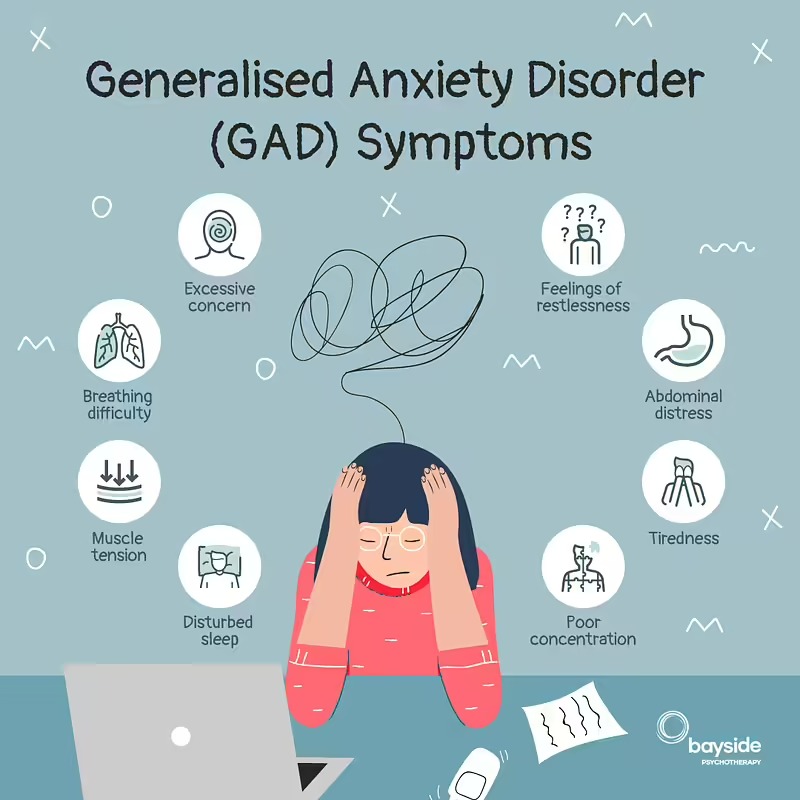One-on-one counselling for anxiety sessions that truly help
One-on-one counselling for anxiety sessions that truly help
Blog Article
Exploring Various Approaches in Therapy for Stress And Anxiety Problem for Lasting Change
When taking on anxiousness disorders, it's vital to check out a variety of counseling techniques. Each method provides special understandings and devices to assist you manage your signs successfully. You might find that integrating techniques can yield the most effective results. However, understanding the nuances of these methods is key to fostering long-term adjustment. What happens if the ideal mix could release a brand-new level of psychological health for you?
Understanding Anxiousness Conditions: A Short Overview
Anxiousness conditions, which affect millions of individuals worldwide, can considerably impact daily life. You could experience overwhelming sensations of anxiety or stress that appear uncontrollable. These feelings can bring about physical signs and symptoms like an auto racing heart, sweating, or also lightheadedness. Typical sorts of anxiousness conditions consist of generalized anxiety problem, panic attack, and social anxiety disorder. Each has special signs, yet they all share a tendency to interrupt your routine and relationships.Understanding the source of your stress and anxiety is important. It might stem from genetics, brain chemistry, or life experiences. Recognizing your triggers can aid you handle your actions better. It is necessary to bear in mind that you're not the only one in this battle. Numerous people face similar difficulties, and looking for help is a strong action towards feeling better. By finding out about stress and anxiety problems, you're already on the course to understanding and managing your condition more successfully.
Cognitive-Behavioral Therapy: Challenging Negative Idea Patterns
In Cognitive-Behavioral Treatment, you'll start by recognizing the adverse idea causes that contribute to your stress and anxiety. You'll work on changing them with even more favorable choices once you identify these thoughts. Together, you'll develop effective coping approaches to help manage your anxiety in day-to-day situations.
Identifying Adverse Thought Triggers

When you experience moments of distress, identifying the particular triggers behind your adverse ideas can be necessary in handling anxiousness. Beginning by taking note of scenarios that prompt sensations of fear or worry. Is it a jampacked area, an upcoming target date, or a conversation with specific people? Write down these circumstances in a journal. This will aid you determine patterns in your reasoning. Notice physical experiences that accompany your unfavorable ideas, like a racing heart or tightness in your upper body. By identifying these triggers, you acquire insight right into what's fueling your anxiousness. Recognizing these connections is the primary step in testing those ideas and inevitably regaining control over your emotional responses.
Replacing Ideas With Positives
Challenging unfavorable idea patterns is a necessary step in changing your frame of mind and minimizing anxiety. You might frequently find on your own trapped in cycles of insecurity or catastrophic thinking. Rather of letting these ideas determine your sensations, technique changing them with favorable affirmations or reasonable choices. When you think, "I can't handle this," change it to, "I can take care of challenges one action at a time." This straightforward change can considerably impact your emotion. Frequently determining and responding to these negative ideas aids develop a healthier interior dialogue. Remember, it requires time and effort, yet continually exercising this strategy can cause long lasting change, empowering you to deal with anxiousness with renewed confidence and durability.
Building Coping Techniques With Each Other
Replacing unfavorable ideas is only the beginning of taking care of anxiety effectively. To develop long lasting change, you require to develop coping methods that equip you. Cognitive-Behavioral Treatment (CBT) aids you identify and test those unhelpful idea patterns. Together, you and your counselor can check out how these ideas impact your feelings and behaviors.Start by creating functional strategies, like journaling or mindfulness workouts, that permit you to face anxiousness head-on. When you face your fears progressively, you'll discover to respond differently.

Mindfulness and Acceptance-Based Approaches: Growing Present-Moment Understanding
As you navigate the complexities of anxiousness, incorporating mindfulness and acceptance-based strategies can significantly enhance your capacity to grow present-moment understanding. By concentrating on the present moment, you'll locate that you can observe your thoughts and feelings without judgment (Counseling services for anxiety). This technique helps you acknowledge your stress and anxiety without really feeling overwhelmed by it.Engaging in mindfulness workouts, such as deep breathing, body scans, or led reflections, permits you to ground yourself in your existing experience. Acceptance-based approaches motivate you to accept your emotions instead of combat versus them. They shed their power over you.Incorporating these techniques right into your everyday routine can change how you respond to anxiety when you approve your feelings. You'll develop durability and learn to navigate demanding scenarios with greater convenience. Eventually, growing present-moment recognition lays the foundation for long-term modification, equipping you to lead a more meeting life
Exposure Therapy: Confronting Anxieties Progressively
Direct exposure treatment assists you challenge your fears in a steady means, making it much less overwhelming. You'll learn methods to encounter anxiety-provoking situations detailed, while likewise building coping approaches to handle your responses. This strategy encourages you to take control and lower anxiousness in time.
Steady Direct Exposure Techniques

When encountering anxiety, progressively confronting your anxieties can be an effective means to regain control. This method, referred to as gradual exposure, includes slowly exposing yourself to the scenarios or objects that trigger your stress and anxiety. Begin with less daunting scenarios and progressively work your method approximately more tough ones. For instance, if you hesitate of public speaking, you may start by speaking before a mirror, then proceed to sharing thoughts with a friend, and at some point attend to a small team. Each step helps desensitize you to the worry, building your confidence over time. Remember, it's necessary to pace on your own and celebrate small victories as you relocate with this procedure, strengthening your capacity to take care of anxiousness successfully.
Structure Coping Techniques
Building reliable coping techniques is important for handling anxiety, specifically as you confront your fears gradually - Counseling services for anxiety. One powerful approach is direct exposure treatment, where you start by encountering your concerns in a controlled manner. Begin with less intimidating circumstances and slowly function your method as much as more difficult situations. This progressive direct exposure helps desensitize you to anxiety causes, making them less overwhelming.Incorporate relaxation techniques, such as deep breathing or mindfulness, to calm your mind throughout direct exposure. Track your progression, commemorating little victories along the road to boost your confidence. Bear in mind, it's all right to take your time; the objective isn't excellence but steady improvement. By building these strategies, you'll empower yourself to navigate stress and anxiety and accept life much more fully
Psychodynamic Therapy: Uncovering Root Reasons of Anxiousness
Psychodynamic treatment discovers the subconscious mind, exposing the source of your stress and anxiety. By examining your thoughts, feelings, and previous experiences, this approach assists you uncover underlying disputes and unresolved concerns that may contribute to your existing anxiety. You'll deal with a specialist to explore childhood experiences, connections, and psychological patterns that shape your feedbacks today.As you gain insight right into these deeper layers of your subconscious, you'll begin to identify just how previous events influence your present behavior. This understanding can lead to catharsis, enabling you to process feelings you may have suppressed.Through the healing connection, you can also determine protection systems that might have established in time, using a more clear course to alter. Ultimately, psychodynamic treatment outfits you with the tools to resolve your anxiety at its core, promoting lasting makeover in your emotional wellness.
Alternative and integrative Techniques: Combining Techniques for Greater Effectiveness
Incorporating various healing techniques can improve your trip toward handling anxiety a lot more efficiently. By integrating components from cognitive-behavioral therapy, mindfulness techniques, and holistic methods, you can develop an individualized method that resolves your distinct demands. You could make use of cognitive-behavioral strategies to test unfavorable idea patterns while integrating mindfulness workouts to ground on your own in the existing moment.Additionally, discovering holistic practices such as yoga or meditation can promote leisure and reduce anxiety symptoms. This blend enables you to create greater self-awareness and resilience.Experimenting with these diverse methods can help you uncover what reverberates most with you. Keep in mind, it has to do with finding a synergy that functions, as opposed to adhering to a solitary technique. This integrative approach not just supplies immediate relief but also cultivates long-term skills for managing anxiousness, empowering you to recover control over your life.
The Function of Assistance Systems: Building Durability Via Connection
While it might seem that taking care of stress and anxiety is a solitary trip, having a strong assistance system can play a crucial function in your resilience. Bordering yourself with understanding good friends, family, or assistance groups develops a risk-free room where you can freely share your feelings and experiences. You remind on your own that you're not alone in this struggle.These partnerships supply encouragement and can give useful coping techniques that have worked for others when you connect with others. It's also a chance to gain viewpoint; pals can assist you see scenarios in different ways, lowering feelings of isolation.Moreover, emotional assistance fosters a feeling of belonging, which can considerably relieve anxiety signs and symptoms. By leaning on your support system, you can construct durability and deal with difficulties extra efficiently. Bear in mind, getting to out for aid signifies stamina, and it can make all the distinction in your trip towards managing anxiety.
Frequently Asked Concerns
What Are the Common Signs of Anxiousness Disorders?
You might experience restlessness, fatigue, problem concentrating, irritation, muscle mass stress, and sleep disturbances. Physical signs can consist of fast heart beat, sweating, and shivering. Identifying these indicators early can help you seek appropriate support and treatment.
How Much Time Does Treatment Usually Last for Anxiousness Problems?
Therapy for stress and anxiety problems generally lasts anywhere from a couple of weeks to numerous months. It really depends upon your specific needs, progress, and the techniques your therapist makes use of to assist you handle your stress and anxiety properly.
Can Medication Be Used Together With Treatment for Anxiousness?
Yes, drug can certainly be made use of alongside therapy for stress and anxiety. Incorporating both methods usually improves treatment performance, helping you manage signs while checking out underlying concerns via counseling (Counseling services for anxiety). website Always consult your health care company for tailored suggestions
Are There Self-Help Approaches for Taking Care Of Anxiousness?
Yes, there are numerous self-help approaches for taking care of anxiousness. You can exercise mindfulness, participate in regular workout, preserve a balanced diet regimen, develop a routine, and make use of deep breathing methods to help minimize anxiety signs and symptoms successfully.
How Do I Know if I Required Expert Aid for Anxiety?

Report this page